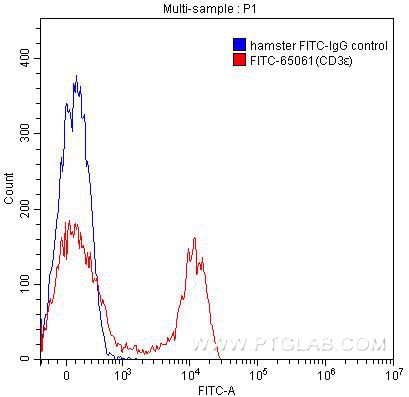Anticorps Monoclonal anti-CD3ε
CD3ε Monoclonal Antibody for FC
Hôte / Isotype
Hamster / IgG
Réactivité testée
souris
Applications
FC
Conjugaison
FITC Fluorescent Dye
CloneNo.
500-A2
N° de cat : FITC-65061
Synonymes
Galerie de données de validation
Applications testées
| Résultats positifs en cytométrie | splénocytes de souris, |
Dilution recommandée
| Application | Dilution |
|---|---|
| This reagent has been tested for flow cytometric analysis. It is recommended that this reagent should be titrated in each testing system to obtain optimal results. | |
| Sample-dependent, check data in validation data gallery | |
Informations sur le produit
FITC-65061 cible CD3ε dans les applications de FC et montre une réactivité avec des échantillons souris
| Réactivité | souris |
| Hôte / Isotype | Hamster / IgG |
| Clonalité | Monoclonal |
| Type | Anticorps |
| Immunogène | Complexes immuns isolés de cellules de thymome C6VL-BS |
| Nom complet | CD3 antigen, epsilon polypeptide |
| Numéro d’acquisition GenBank | BC098236 |
| Symbole du gène | Cd3e |
| Identification du gène (NCBI) | 12501 |
| Conjugaison | FITC Fluorescent Dye |
| Excitation/Emission maxima wavelengths | 498 nm / 526 nm |
| Forme | Liquide |
| Méthode de purification | Purification par affinité |
| Tampon de stockage | PBS avec azoture de sodium à 0,1 %. |
| Conditions de stockage | Store at 2-8°C. Avoid exposure to light. Stable for one year after shipment. |
Informations générales
CD3 is a multimeric protein associated with the T-cell receptor (TCR) to form a complex involved in antigen recognition and signal transduction (PMID: 15885124). CD3 is composed of CD3γ, δ, ε, and ζ chains (PMID: 1826255). It is expressed by thymocytes in a developmentally regulated manner, T cells, and some NK cells (PMID: 3289580). The TCR recognizes antigens bound to major histocompatibility complex (MHC) molecules. TCR-mediated peptide-MHC recognition is transmitted to the CD3 complex, leading to the intracellular signal transduction (PMID: 11985657).
Protocole
| Product Specific Protocols | |
|---|---|
| FC protocol for FITC CD3ε antibody FITC-65061 | Download protocol |
| Standard Protocols | |
|---|---|
| Click here to view our Standard Protocols |


